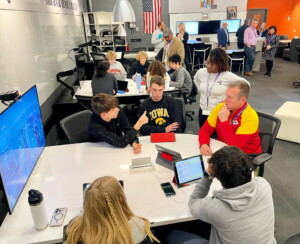Why Mentors Matter

Sarah Vander Schaaff
During my senior year in high school, just about when the pressure of life and the ambivalence of graduation overwhelmed me, my dear drama teacher summoned me to his office from gym class. We both needed a break, he said. We hopped in his red and white pick-up truck and headed to the best bakery in Austin.
Mr. Preas was my mentor. He taught me the discipline and craft of acting, and took my work seriously, even though I was a young performer. He believed in me and encouraged me to have faith in myself. One day, probably a few months after that muffin run, when a telegram arrived stating some good news about my place in a national arts competition, he burst into my typing class and read the note for all to hear. Our typing drill simply had to wait, as he read the short sentences with Texas pride.
Mr. Preas smoked during rehearsal; swore, at times, and had little patience for the juvenile behavior of those he called yahoos. But he was devoted to his job, and he was devoted to anyone who wanted to learn. He entered my life during the rocky but exciting time of adolescence and gave me a place to explore friendships, dramatic literature, the human condition, and even heartache. He was exactly what a young person seeks in a mentor. Parents may provide unconditional love, but a mentor’s encouragement means something else: it means the world outside your familial nest sees something in you.
The fall of my senior year in college, I left Evanston and caught a flight back to Texas. My folks had since moved so I stayed with a high school friend who helped me get to Mr. Preas’ house. I sat at the side of his bed while he rested, his body truly ravaged by the effect of AIDS.
One day, back at college, I took a jog by the lake. I felt something that, to this day, I cannot describe accurately in words. It was a feeling—something in the air. I got back to my room and a phone call told me Mr. Preas had died. “Carpe Diem” he had once told me, and now I knew I’d need to do it without him in my life.
When I started teaching drama about ten years ago, I hoped I could live up to his dedication and influence. But deep down I knew: he was inimitable.
So, what does it take to be a mentor in this world of rules, most there for good reason? And what does it take, as a parent, to trust another adult with the privilege of earning our child’s trust and respect?
I think that’s the rub in this day and age. As parents, we are vigilant about protecting our children from adults who might take advantage of them, emotionally or physically. As teachers, we are cognizant of the protocols for teacher-student interaction. (Can you image pick-up truck rides off campus during gym class today?) And certainly students feel pressure to earn good grades. And the fact is, some will shy away from an inspirational, but “tough” teacher because they’ve heard it will sink their GPA. It’s a strategy that reminds me of the proverb comparing the benefits of giving a man a fish or teaching him how to catch one for the rest of his life. How can a young person make that choice unless we give them permission to seek knowledge rather than perfection?
If we’re willing to say that mentors are essential, and if you have your own “Mr. Preas” in your life, then perhaps you’ll agree that they are, then we need to be willing to do what it takes to make room for the mentor relationship in our children’s lives.
How do we do that?
I believe the over-riding principle is: be present. The buck stops with you, the parent.
Teachers, coaches, instructors, and other possible mentors often have reputations that precede them. It’s good to hear what others have to say but it’s more important to do your own due diligence. See them in action. Listen to what parents whose children are similar to your own child have to say. Context matters. So does your child’s temperament. And check your ego at the door. It’s how the relationship supports your child, not the wow-factor of the mentor’s name that ignites a child’s own initiative.
Be present by listening when your child discusses a mentor. Why does he or she feel a connection? Are they inspired? Are they growing? Or are they intimidated and made to feel that their efforts aren’t good enough? I’d say those are red-flags. I know some will disagree.
We’ve all read stories about a coach, or teacher, or some other trusted adult, facing punishment for having violated the mentor relationship. It’s fear of this that makes many parents justifiably cautious. Be armed with facts, and give your children the skills to develop their own boundaries and instincts. A great book to help with that is Gavin de Becker’s, Protecting the Gift: Keeping Children and Teenagers Safe (and Parents Sane). Mr. de Becker is an expert in predicting violence and his book has special relevance in the context of examining the mentor relationship.
And finally, be sensitive to the moments of transition when your child leaves one mentor for bigger things. It’s an inevitable evolution, if the mentor and you have done your jobs. In all that excitement of graduation, or advancement to another level, or other moments that imply a “good-bye” give your children the chance to express their fear and sadness that a particular phase in their lives is ending.
Gone are the days of red pick-up trucks and runs to the bakery during gym class.
And I miss Mr. Preas every day.
This blog is part of our Smart Parents series in partnership with the Nellie Mae Education Foundation. For more information about the project, see Parents, Tell Your Story: How You Empower Student Learning as well as other blogs:
- Never The First To Finish: Why Pace Matters
- Today’s Busy Families are Finding Time to Gather Around the Dinner Table
- Power of Play: Applied Knowledge, Engaged Learning
 Sarah M. Vander Schaaff writes the weekly blog, The Educated Mom. She is the managing editor of media and content for Mindprint Learning. She lives in New Jersey with her husband and two daughters. Follow her @educatedmomMP.
Sarah M. Vander Schaaff writes the weekly blog, The Educated Mom. She is the managing editor of media and content for Mindprint Learning. She lives in New Jersey with her husband and two daughters. Follow her @educatedmomMP.







0 Comments
Leave a Comment
Your email address will not be published. All fields are required.